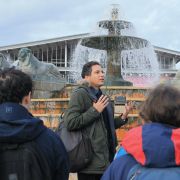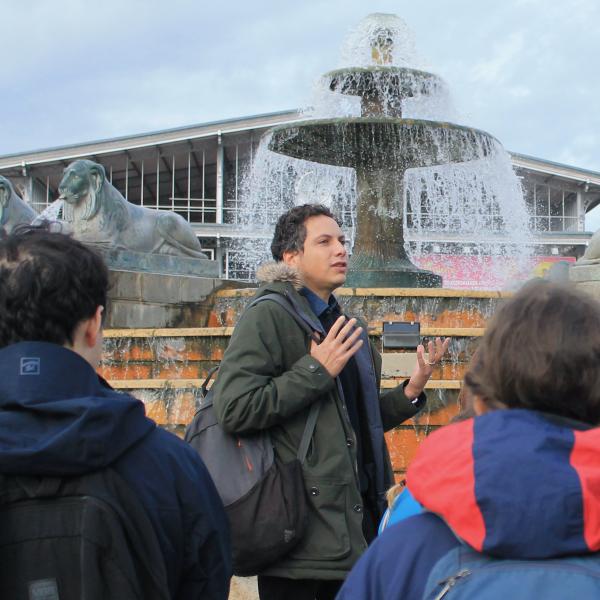Pablo Navarrete Hernandez
School of Architecture and Landscape
Lecturer in Landscape Planning


Full contact details
School of Architecture and Landscape
Arts Tower
Western Bank
Sheffield
S10 2TN
- Profile
-
I am a Lecturer in Landscape Planning at the Department of Landscape Architecture at University of Sheffield. I have previously held positions as an Assistant Professor in the Faculty of Architecture and Urban Studies at Universidad de Chile, Research Associate in the Department of Architecture and Urban Studies at Politecnico di Milano (POLIMI-DAStU), Postdoctoral Fellow at the Centre for Sustainable Urban Development (CEDEUS) at Pontificia Universidad Católica de Chile (PUC), and Visiting Scholar in the MIT Department of Urban Studies and Planning (MIT-DUSP) and the Latin America and Caribbean Centre at the London School of Economics. I am co-founder of the experimental big-data analysis platform urban-experiment.com.
I have worked as an architect and urban planner in the private and public sectors, including local and central government. In particular, I worked as an urban planner for La Cisterna Council in the Santiago Metropolitan Region, the Ministry of Housing and Urban Development of Chile and Ministry of Transport of Chile, and as a consultant for the Development Bank of Latin America (CAF).
In 2013, I was appointed as the urban and regional policy advisor of Chilean president Michelle Bachelet's presidential campaign, leading on the housing, urban planning, and regional development sections of her manifesto. These policy proposals were then implemented by the Ministries of Housing and Urban Development, Economy, Transport, and by the National Commission of Urban Development (CNUD).
- Qualifications
-
I hold an Architecture Degree (equivalent to RIBA parts 1, 2 and 3) from the Universidad de Chile, a double MSc in Urban Policy from Sciences-Po Paris and the London School of Economics (LSE), and a PhD in Regional and Urban Planning from LSE.
- Research interests
-
- The impact of the built environment on emotions and perceptions
- Fear of crime in the urban environment: triggers and solutions
- Built environment design to promote sustainable behaviour.
- The spillover of nature into societal outcomes: cognitive, mental and physical health
- Urban environments that promote inclusion and exclusion
My research is cross disciplinary and policy relevant, operating at the intersection of urban design and planning, public policy, behavioural science and environmental psychology. I investigate the relationship between the built environment, human behaviour and emotions to promote sustainable, healthy and inclusive futures for cities (an approach I term urban behavioural science or UBS).
My research tackles questions such as:
- What is the role of urban planning and design in shaping people's emotions and behaviour?
- Can neighbourhood-level green infrastructure promote residents’ emotional wellbeing and mental health?
- Can UBS facilitate the adoption of low-carbon urban infrastructure and behaviour?
- Can UBS contribute to creating more diverse and inclusive urban environments?
I use primary causal quantitative research, conducted both online and in field experiments, complemented with qualitative research, to reach an in-depth understanding of the interaction between the built environment and human behaviour, and to define urban environments that foster wellbeing and sustainable choices and actions.
I am committed to policy impact, working with a wide range of communities, government bodies, and international organisations in Chile, Brazil, Mexico, the United States, the United Kingdom, and Italy. My early research was focused on urban policy decision-making and its impact on local self-employment, poverty alleviation and access to city opportunities.
- Publications
-
Journal articles
- Green Enough? A dose-response curve of the impact of street greenery levels and types on perceived happiness. Landscape and Urban Planning, 251, 105130-105130.


- Preserving enough? A randomised controlled trial approach to determine relevant urban planning regulations for small touristic towns – A case of Chiloé, Chile. Habitat International, 146, 103033-103033.


- The impact of nature-based solutions on perceptions of safety in public space. Journal of Environmental Psychology, 91, 102132-102132.


- Planning for fear of crime reduction: Assessing the impact of public space regeneration on safety perceptions in deprived neighborhoods. Landscape and Urban Planning, 237, 104809-104809.


- The impact of small-scale green infrastructure on the affective wellbeing associated with urban sites. Scientific Reports, 13(1).


- Mind the perception gap: The impact of bus rapid transit infrastructure on travelers’ perceptions of affective subjective well-being. Transportation Research Part A: Policy and Practice, 172, 103670-103670.


- Inclusive informal-to-informal trade: the poverty alleviation potential of street vendors’ trade networks in Santiago de Chile. Third World Quarterly, 44(8), 1844-1864.


- Health Effects of Increasing Income for the Elderly: Evidence from a Chilean Pension Program. American Economic Journal: Economic Policy, 15(1), 370-393.


- An evaluation of the impact of COVID-19 safety measures in public transit spaces on riders' Worry of virus contraction. Transport Policy, 131, 1-12.


- Enlightening wellbeing in the home: the impact of natural light design on perceived happiness and sadness in residential spaces. Building and Environment, 223. View this article in WRRO


- A “Financialised Production of Space”. Analysing Real Estate Investment Funds through Lefebvre’s Spatial Triad. Housing, Theory and Society, 39(3), 359-379.


- Delivering higher density suburban development: The impact of building design and residents’ attitudes. Urban Studies, 59(13), 2801-2820.


- Building safer public spaces: Exploring gender difference in the perception of safety in public space through urban design interventions. Landscape and Urban Planning, 214, 104180-104180.


- A greener urban environment: Designing green infrastructure interventions to promote citizens’ subjective wellbeing. Landscape and Urban Planning, 191, 103618-103618.


- Urban Systems of Accumulation: Half a Century of Chilean Neoliberal Urban Policies. Antipode, 51(3), 899-926.


- Unleashing Waste-Pickers’ Potential: Supporting Recycling Cooperatives in Santiago de Chile. World Development, 101, 293-310.


- Rethinking waste-picking: The role of municipal policy in improving scavengers’ sustainability. Investigaciones Regionales, 2016(35), 83-106.


- Race-based readings of safety in public space in Milan, the challenge for urban design. European Urban and Regional Studies, 096977642211295-096977642211295.


- Green Enough? A dose-response curve of the impact of street greenery levels and types on perceived happiness. Landscape and Urban Planning, 251, 105130-105130.
- Grants
-
I have received several grant and awards, including four innovation grants to embed urban research methods into software development – three from the Chilean Economic Development Agency and one from LSE Generate – two highly competitive research grants (four prizes awarded from over 300 applications) from CAF-Development Bank of Latin America, the Marie Skłodowska-Curie Seal of Excellence, the LSE PhD Studentship, the President of Chile Graduate Scholarship, and was also offered the Leverhulme Early Career Fellowship, Fulbright PhD Grant and UCLA Luskin PhD Scholarship.
- Teaching activities
-
- LSC 117 - Presentation, Communication and Research Skills
- LSC 619 - Doctoral Training in Landscape (ACADEMIC YEAR 2022~23)
- LSC61005 Research module - Landscape research topics (SPRING 2022~23)
- Special Project: Informal Urbanisation in the global South
- Professional activities and memberships
-
- Doctoral Research
- Year 1 Coordinator
- Funded research projects
- 2020-22, Fondo Inicia, Universidad de Chile
- 2020-21, Research Fellowship, Politecnico di Milano
- 2019-20, Semilla Expande, Chilean Economic Development Agency
- 2019-20, Huella, StartUP Chile (grant offered)
- 2018-19, LSE Generate, London School of Economics
- 2018-20, Seeds Fund, StartUp Chile
- 2017, Research Grant, CAF-Development Bank of Latin America
- 2016, Research Grant, CAF-Development Bank of Latin America
- 2015, Doctoral Research, LSE Festival, London School of Economics
- 2014, Santander-LSE Travel Grant, London School of Economics
